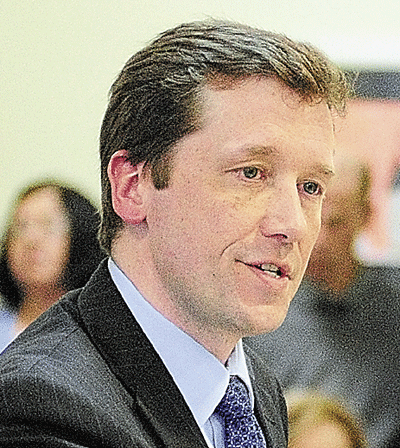LEWISTON — The state’s new plan for improving literacy revolves around an expansive definition of literacy skills and depends on the collaboration of a broad spectrum of government agencies, education providers and community organizations.
The initative, Literacy for ME, calls for communities to develop their own plans to improve the literacy of their residents from birth to adulthood. Some work also will take place at the state level, including coordination among the departments of Education, Labor, Corrections and Health and Human Services.
Launching the initative at Lewiston Public Library on Tuesday, Education Commissioner Stephen Bowen said communities are likely to receive little if any financial support from the state and that efforts can’t fall entirely on public schools, which are “maxed out.”
He said early-childhood education providers, public schools, adult education programs, higher education institutions, charitable foundations and other entities often operate in silos and need to work together to figure out where gaps exist and how to fill them.
“I don’t see this as a new, extra thing,” Bowen said. “You can see all kinds of great initiatives going on all over the place. It’s not about creating something new. It’s about taking what we’re doing and building it into a coherent sort of vision, a coherent sort of plan.”
The evidence that Maine needs to raise literacy levels comes from a variety of sources, Department of Education Specialist Lee Anne Larsen said in an interview.
On the National Assessment of Educational Progress, sometimes called “the nation’s report card,” Maine students in fourth and eighth grades scored lower in reading in 2011 than in 2007. In writing, only 41 percent of fifth-graders and 51 percent of eighth-graders rated “proficient” or above on the latest New England Common Assessment Program tests.
Large minorities of college students require remedial education because they lack the skills they need for entry-level courses, and Larsen said many employers report not being able to find workers who can process technical information and communicate effectively.
Peter Geiger, executive vice president of Geiger Promotional Products and a nominee for a State Board of Education seat, said his company has found that only one-third of prospective hires could pass the mathematics and literacy tests they administer.
Larsen said the decline of factory and agricultural jobs has created a need for more advanced literacy skills. No longer is it enough to be able to read, so the literacy initiative includes skills such as assessing and synthesizing information, drafting proposals, written communication, speaking and listening.
“In order to be successful in college, career and citizenship, the level of literacy that they’re going to need is much higher than it once was,” she said.
The Department of Education has organized a series of six daylong workshops around the state and is asking communities to send teams to learn about how they can create their local literacy plans. Schools and school districts are encouraged to the lead the formation of those teams, which could include educators, librarians, health care providers, parents and directors of businesses or civic organizations.
One regional workshop will take place Sept. 25 at Le Club Calumet in Augusta, and another on Sept. 28 at the Seasons Conference Center in Portland.
State officials will provide local teams with a framework and a tool kit to develop their plans. As plans are implemented, the state will provide professional development for educators and monitor literacy data to guide policies and goals.
At Tuesday’s kickoff event, several people spoke about existing literacy programs in Lewiston and Androscoggin County. “Ready … Read!” encourages parents to read to their young children daily, Lewiston Public Schools has sixth-grade students tutor each other, and Lewiston Adult Education offers courses for computer literacy and financial literacy.
Adult Education Director Eva Giles said literacy is of primary importance to schools, and she challenged other organizations to make sure that people of all ages have the skills they need.
“We know that adequate literacy skills impact more than just the success of individuals but also the growth and prosperity of an entire community,” Giles said. “A community is only as successful as its residents.”
Send questions/comments to the editors.



Success. Please wait for the page to reload. If the page does not reload within 5 seconds, please refresh the page.
Enter your email and password to access comments.
Hi, to comment on stories you must . This profile is in addition to your subscription and website login.
Already have a commenting profile? .
Invalid username/password.
Please check your email to confirm and complete your registration.
Only subscribers are eligible to post comments. Please subscribe or login first for digital access. Here’s why.
Use the form below to reset your password. When you've submitted your account email, we will send an email with a reset code.